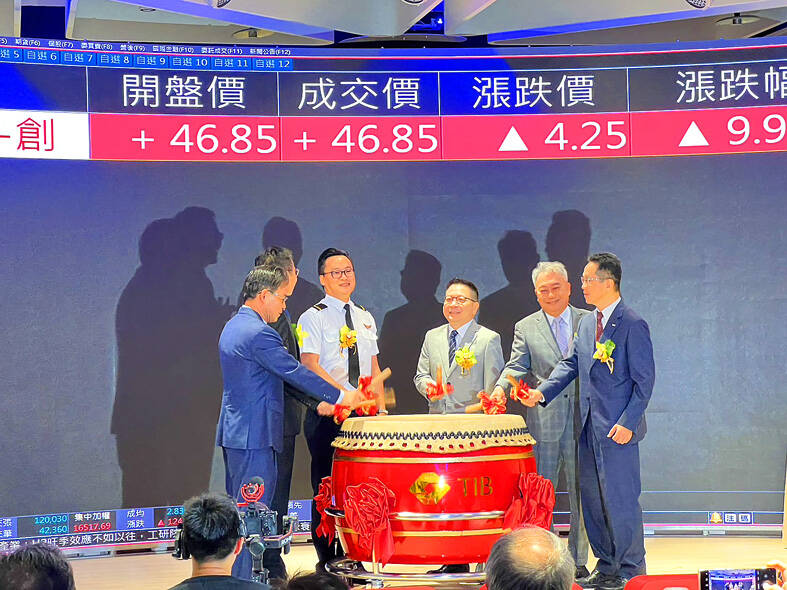Shares of Tigerair Taiwan Ltd (台灣虎航) yesterday rose 4.46 percent on their debut on the Taiwan Stock Exchange’s (TWSE) new trading platform — the Taiwan Innovation Board.
The low-cost carrier became the 10th company to launch an initial public offering (IPO) on the main bourse this year. It was also the first time an airline has gone public on the TWSE since EVA Airways Corp’s (長榮航空) listing in 2001.
China Airlines Ltd (CAL, 中華航空) listed its shares on the main bourse in 1993, while Starlux Airlines Co (星宇航空) has been trading its shares on the Taipei Exchange’s Emerging Stock Board since September last year.

Photo: Wang Yi-hung, Taipei Times
Tigerair shares rose to their 10 percent daily limit of NT$46.85 in early morning trade from its IPO price of NT$42.60, before retreating to close at NT$44.50, outpacing the TAIEX’s 0.37 percent rise.
Established in 2014 as a joint venture between CAL and Singapore’s Tiger Airways Ltd before becoming CAL’s wholly owned subsidiary in 2017, Tigerair offers flights to 27 destinations in Asia, including Japan, Macau, Philippines, South Korea, Thailand and Vietnam.
The airline posted a net profit of NT$336.07 million (US$10.52 million) last quarter, its second straight quarterly profit after the first quarter’s NT$428.63 million.
First-half net profit totaled NT$764.7 million, or earnings per share (EPS) of NT$1.87, compared with losses of NT$3.61 per share a year earlier due to the impact of the COVID-19 pandemic.
Among listed airlines, Tigerair’s first-half EPS was second only to EVA’s NT$1.95, and ahead of CAL’s NT$0.77 and Starlux’s NT$0.18, exchange data showed.
The budget carrier’s combined revenue in the first seven months of the year jumped 1,762.84 percent year-on-year to NT$6.74 billion, after last month’s sales surged 2,223.41 percent to a record NT$1.26 billion, as the industry continued to benefit from strong demand for air travel since the relaxation of border controls in October last year.
Unique Satellite TV quoted Tigerair chairman Kevin Chen (陳漢銘) as saying at yesterday’s listing ceremony that the carrier’s business in the second half of the year would be even better than the first half.
Tigerair’s net value per share improved to NT$6.01 in the second quarter, from NT$3.46 in the first quarter.
The carrier aims to raise the figure close to its par value of NT$10 by the end of this year by lowering aggregate losses, Chen said.
Tigerair has accumulated losses of about NT$2.2 billion, company data showed.
The airline has so far accepted deliveries of four Airbus 320neos and would continue to renew its fleet until 2027, Chen said.
“Tigerair will receive another 11 A320neos by 2027, as the company plans to retire two old planes while adding two new aircraft each year over this period,” Chen was quoted as saying. “By 2027, the average age of Tigerair’s 15-plane fleet would be only three-and-a-half years old, making it the youngest fleet among Taiwanese airlines.”

Taiwan will prioritize the development of silicon photonics by taking advantage of its strength in the semiconductor industry to build another shield to protect the local economy, National Development Council (NDC) Minister Paul Liu (劉鏡清) said yesterday. Speaking at a meeting of the legislature’s Economics Committee, Liu said Taiwan already has the artificial intelligence (AI) industry as a shield, after the semiconductor industry, to safeguard the country, and is looking at new unique fields to build more economic shields. While Taiwan will further strengthen its existing shields, over the longer term, the country is determined to focus on such potential segments as

UNCERTAINTY: Innolux activated a stringent supply chain management mechanism, as it did during the COVID-19 pandemic, to ensure optimal inventory levels for customers Flat-panel display makers AUO Corp (友達) and Innolux Corp (群創) yesterday said that about 12 to 20 percent of their display business is at risk of potential US tariffs and that they would relocate production or shipment destinations to mitigate the levies’ effects. US tariffs would have a direct impact of US$200 million on AUO’s revenue, company chairman Paul Peng (彭雙浪) told reporters on the sidelines of the Touch Taiwan trade show in Taipei yesterday. That would make up about 12 percent of the company’s overall revenue. To cope with the tariff uncertainty, AUO plans to allocate its production to manufacturing facilities in

COLLABORATION: Given Taiwan’s key position in global supply chains, the US firm is discussing strategies with local partners and clients to deal with global uncertainties Advanced Micro Devices Inc (AMD) yesterday said it is meeting with local ecosystem partners, including Taiwan Semiconductor Manufacturing Co (TSMC, 台積電), to discuss strategies, including long-term manufacturing, to navigate uncertainties such as US tariffs, as Taiwan occupies an important position in global supply chains. AMD chief executive officer Lisa Su (蘇姿丰) told reporters that Taiwan is an important part of the chip designer’s ecosystem and she is discussing with partners and customers in Taiwan to forge strong collaborations on different areas during this critical period. AMD has just become the first artificial-intelligence (AI) server chip customer of TSMC to utilize its advanced

Chizuko Kimura has become the first female sushi chef in the world to win a Michelin star, fulfilling a promise she made to her dying husband to continue his legacy. The 54-year-old Japanese chef regained the Michelin star her late husband, Shunei Kimura, won three years ago for their Sushi Shunei restaurant in Paris. For Shunei Kimura, the star was a dream come true. However, the joy was short-lived. He died from cancer just three months later in June 2022. He was 65. The following year, the restaurant in the heart of Montmartre lost its star rating. Chizuko Kimura insisted that the new star is still down